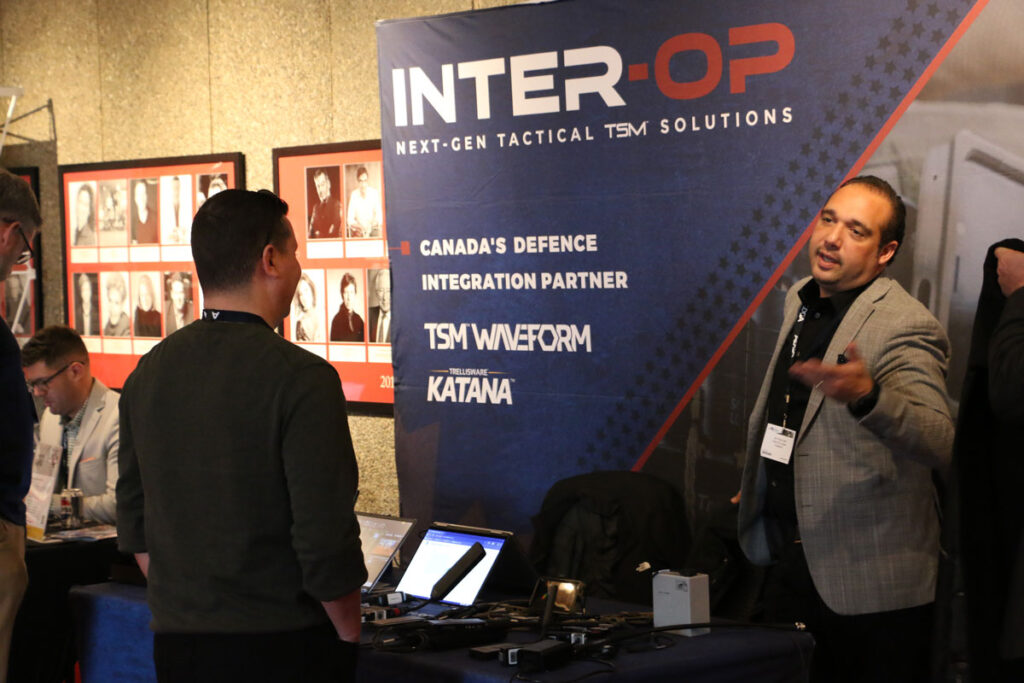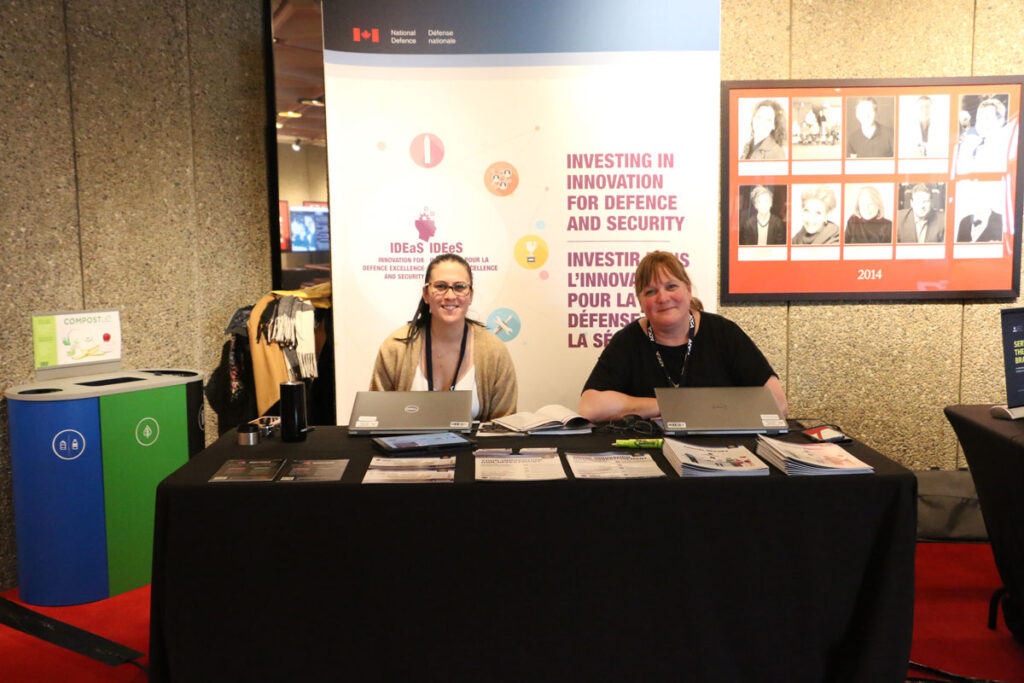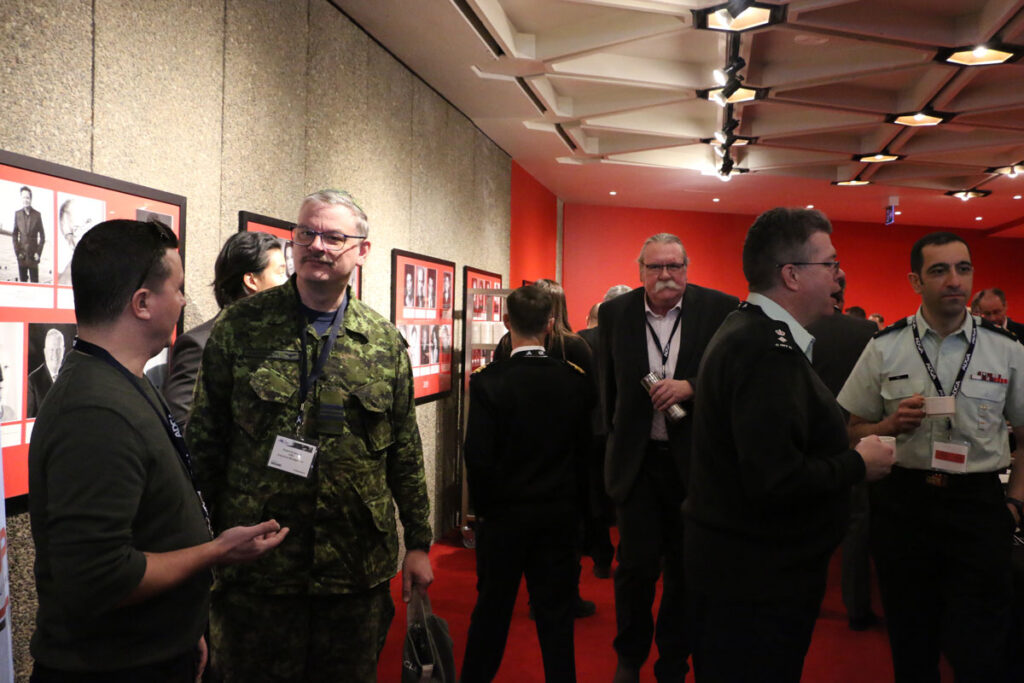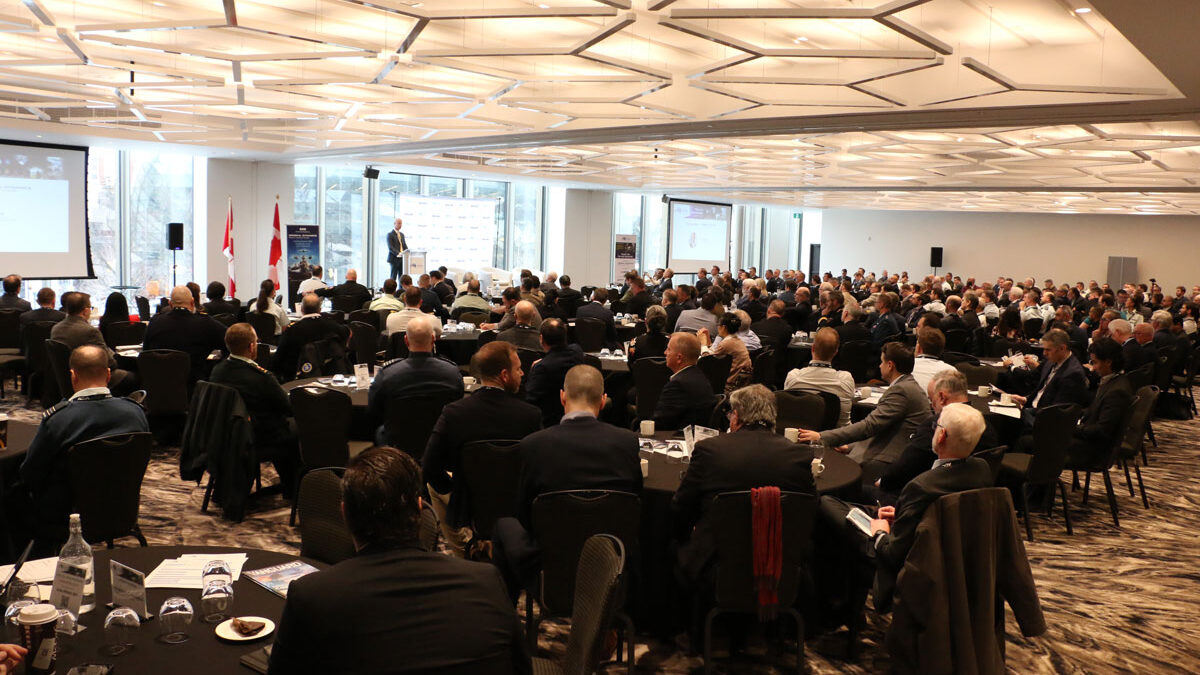VANGUARD AND CONFERENCE ATTENDEES CELEBRATED A TREMENDOUS MILESTONE TOGETHER ON 30 JANUARY THIS YEAR AND TACKLED AN IMPORTANT, TIMELY TOPIC
This year’s theme was particularly welcome and timely: Interoperability and Integration – getting through the tensions to see these lived at scale and speed. The conference was exceptionally well supported and attended, with around 450 participants, in-person and virtual, including senior leaders across the CAF, DND, Industry, and international partners.
As MC for the fourth consecutive year, I was truly fortunate to share some introductory thoughts for participants to reflect on throughout the day, specifically to challenge some of our orthodoxies on security and risk. Orthodoxies that are hurting our efforts to perform in this space. On security, I noted that despite recent amendments to TBS Security policies, Defence’s underlying security classification framework has not changed in the last 40 years. As such, it is no longer fit for purpose and is out of step with our Five-Eyes Partners, as is our defined level of injury for individual security classifications. The net result is a culture of over- classification that is further exacerbated by Canada’s simplistic approach to data aggregation. On risk, I also introduced the concept of an aggregate risk profile which senior executives intuitively seek to apply to decrease capability and mission risk over time. Seeing risk only through silos is hurting us too. Overcoming these will remove and mitigate some significant barriers to progress.

VAdm Bob Auchterlonie, Commander Canadian Joint Operations Command and MGen Mike Wright, Commander of Canadian Forces Intelligence Command, provided us with an exceptional take on Canada’s and the CAF’s current and near- term operating environment – our Mission Charter for the day. They objectively and compellingly framed the risks of our current state – including jeopardy to con- tributing meaningfully to coalition operations, our relevance and effectiveness in the digital age, and being left farther be- hind our allies and adversaries. Their candid observations of current Defence challenges in the broader context of the five transnational trends and five geopolitical pressure points underscored the sense of urgency for Canadian Defence to get through the tensions to deliver C4ISR at scale and speed.
Lt Gen (Ret’d) Clint Hinote, the former Deputy COS USAF and the first leader of Air Force Futures delivered a compel- ling keynote. We heard his thoughts on answering the question, how do we de- fend democracy in our time? He noted that strategically the world is transitioning from an era of Western democracies with decisively offensive capabilities to a world where defence is becoming more predominant and at significantly less cost. In deterrence terms, he noted that when, not if, aggression comes the first priority will be to help those attacked by inflicting massive attrition on the attacker, and to preclude or delay their ability to establish a Defensive posture. The importance of the digital backbone to enabling an understanding of “what is going on” and ‘how to integrate and deliver decisive effects together’ will be key to western militaries and their nation’s interests.
Panel 1 examined the tensions them- selves. We were very fortunate to have Sam Michaud, Col (Ret’d), share his analysis of previous significant Defense trans- formative activities. He noted that a use- ful framework within which to consider the challenge is a triangle with the three sides being people, process and structure. He noted that the track record for De- fence in bringing these three together is very poor. Whereas some are quick to blame it on leadership, the reality is that all of the initiatives were top down, led by many of the nations’ best leaders. As such we should not overlook the fact that we are dealing with wicked and super wicked problems. Tensions such as strong service culture, values, “capital P” and “small p” politics, and the diarchy of Defence all contribute to impeding progress. As Canada continues to struggle with these issues, it was interesting to hear a Five- Eyes perspective from MGen Gould, the Head of Cyber Operations and Strategic J6, Australian Defence Force. He noted that Australia believes that they have lost their 10-year warning time to be prepared for conflict. That has focused the nation to transition from a joint force to an integrated force, and from a balanced force to a focused force with an emphasis on specific capabilities. They have a good sense of what the first battle would look like but admit that the design of a campaign remains tenuous. NATO’s JISR Di- rector, Matt Roper, discussed the requirement for Zero Day Readiness and the challenges of its realization in a paradigm of excessive governance, lack of coherent architectural principles, and competing national procurement agendas. It was evident that as the geostrategic position continues to deteriorate that a sense of urgency helps with overcoming many of the tensions. MGen Chris Zimmer shared the growing awareness and deep under- standing of the tensions at play in getting at capability, speed, and scale, and on how there is growing appetite to further see these exposed and overcome – including with new ways and new partners.

Over the course of the day, we were privileged to hear three separate testimonials from those who are or were in mission. Col Reekie (former Commander of the Enhanced Presence Battlegroup in Latvia) emphasized the opportunity that comes when we equip our junior leaders – in technology, talent, and ways of working. Together these amplify our competitive advantage over our adversaries in the European theater. Col Palisa (Command- er of Ukraine’s 93rd Separate Mechanized Brigade) took time out of battle to de- scribe how Ukraine as a nation has trans- formed and brings completely new ways of defending and fighting to his Army – at pace and scale. Robert Morrison (PA- COM Director Joint Mission Acceleration Directorate) stepped out of a Pentagon meeting to make the absolute necessity for like-minded nations and military partners to be truly integrated – confounding and changing the calculus of adversaries in the Pacific theatre and beyond – much more visceral.
Panel 2 focused on working through the tensions. The panel consisted of practitioners who have successfully worked through the tensions in large organizations or are currently doing so. It was noted that C4ISR has numerous interpretations but that it essentially encompasses digital to data and ultimately data literacy. The importance in the military concept was shared through the lens of a U.S. military commander who believed that if you are not data literate you are militarily ineffective. LGen Copinger-Symes, Deputy Commander UK Strategic Command, provided a number of themes that need to be reinforced and communicated at every turn. The digital challenge con- fronting western militaries today are not technical, they are people and process problems. Militaries continue to believe that they are different than other industries when in actuality they are closer to being 80% similar and 20% different. Finally, militaries need to transition notions of digital solutions that support the enter- prise as merely administrative and more in keeping with how we would prioritize and consider weapons systems. It was also noted that quick wins are anything but quick wins as they often reinforce silos and are unable to be scaled across the enterprise. Marina Nitze reinforced the importance of success leading to trust and careful consideration in determining which initiatives to initially pursue. The panel reinforced the implications of policy, its interpretation, and how it can often represent a tension that needs to be considered and addressed to ensure successful execution.
The panel also provided some tremendous insights into modern digital practices. For example, there is a poor understanding of agile deliver y, which is anything but ad hoc. It is very much a disciplined process in keeping with our military experiences.
They observed that over today’s senior leaders’ careers, there has been an evolution in the leadership requirements. This evolution necessitates a greater emphasis on multidimensional leadership skills. MGen (ret’d) Colin Keiver emphasized the importance of articulating a vision and strategy and its usefulness for galvanizing the senior leadership. The RCAF experience illustrated the importance of ensuring a common lexicon that was readily understood by practitioners of all ranks, as opposed to the more technical documentation that typically underpin digital aspirations. As important as developing a strategy is, it was also recognized that it is far easier to produce than the challenges associated with its implementation.

Panel 3 addressed breaking in, establishing, and expanding the digital beachhead. Wendy Hadwen noted the complexity in the Westminster system of vertical accountabilities leading to horizontal challenges. This led to a rich con- versation on the importance of non-traditional partnerships, the implications of different risk management cultures, and the importance of trust and risk sharing. It was insightful when the panelists were asked to frame their thoughts through the lens of a team sport. Key takeaways included the importance of skills development and ensuring proper under- standing of which sport is being played.
Our closing panel was dedicated to re- setting the CAF and the Defence Enter- prise. Ross Ermel, ADM Digital Trans- formation Office, RAdm Lou Carrosielli, Chief of Staff, ADM Information Management, and MGen Pete Dawe, Chief of Combat Systems Integration showed up as individual and unified leaders. They acknowledged the numerous and diverse needs and challenges from the tactical practicalities of today to the grand strategic. They demonstrated unity of thought and purpose when discussing how to overcome these challenges and delivering results – in ways that accelerate and scale progress. Their shared conviction and passionate leadership were evident and impressive. Their shared belief and strong leadership were clearly evident and highly impressive. Working more directly with our allies and leveraging their best practices and/or solutions will mitigate risk across the board – for the CAF in mission and on behalf of the Defence Enter- prise. They exposed to us all how Project OLYMPUS, coming in November 2024, is being seized as a forcing function and waypoint driving CAF integrations and interoperability. Finally, they embraced the importance of effective governance, timely and informed decision making, and new partnerships and ways of working as central to ensuring a coherent and effective way forward.
MGen Steve Boivin, Commander Canadian Special Operations Forces Command, delivered an objective, impressive, and motivating closing keynote. He added fuel to the messages from the day. He noted that yes, there are significant challenges, but collectively leadership needs to stop commenting on the problem and push back on the status quo. Success will only occur if digital is led by leadership in a command-centric and staff-enabled model. He noted that that despite challenges and limitations within existing processes, organizations must do a better job of exploiting current permissions and methods to the fullest extent possible – while seeing these changed over time.
The CANSOF story on getting at digital transformation underscores his points – in that it needs to be done, it can be done, and we must do it together.
Closing the day was both a privilege and challenge for me. So much richness, and so much to cover. I asked that we all foster and sustain the sense of urgency that exists and keep top of mind the significant adverse implications that are likely to arise for the CAF if digital at scale and speed are not realized. It was interesting to note the contrasting narratives between the final keynote and the final panel in the De- fence team’s ability to scale digital effectively. Understanding the implications of security, risk and policy will remain significant tensions that will need to be worked through. I reflected that the challenges and the complexities have only increased since I left the CAF in 2019 and it wasn’t easy then. We were truly fortunate to hear from the tremendous leaders in the CAF/ DND and for them to share their commitment and thoughts to enabling a Defence Digital enterprise – and getting at it now.
On behalf of us all, thank you to Terri, the Vanguard team, to the Conference Advisory Committee, and to all who contributed and participated in this event. What a way to celebrate a decade. There is definitely more to come!

